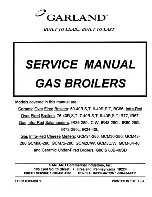
Installation & Operation Manual
68
12
Maintenance
Follow the service and maintenance procedures given throughout this manual and in component literature
shipped with the water heater. Failure to perform the service and maintenance could result in damage to the
water heater or system. Failure to follow the directions in this manual and component literature could result
in severe personal injury, death, or substantial property damage.
The water heater should be inspected annually only by a qualified service technician. In addition, the
maintenance and care of the water heater designated in Table 12A and explained on the following pages must
be performed to assure maximum water heater efficiency and reliability. Failure to service and maintain the
water heater and system could result in equipment failure.
Electrical shock hazard – Turn off power to the water heater before any service operation on the water heater
except as noted otherwise in this instruction manual. Failure to turn off electrical power could result in
electrical shock, causing severe personal injury or death.
Address reported problems
1. Inspect any problems reported by the owner and
correct before proceeding.
Inspect water heater area
1. Verify that water heater area is free of any combustible
materials, gasoline and other flammable vapors and
liquids.
2. Verify that air intake area is free of any of the
contaminants listed in Section 1 - Determine Water
Heater Location. If any of these are present in the water
heater intake air vicinity, they must be removed. If
they cannot be removed, reinstall the air and vent lines
per this manual and the Armor Water Heater Service
Manual.
Inspect water heater interior
1. Remove the front access cover and inspect the interior
of the water heater.
2. Vacuum any sediment from inside the water heater and
components. Remove any obstructions.
Clean condensate trap
1. Inspect the condensate drain line, condensate PVC
fittings, and condensate trap.
2. Remove the PVC cap retaining screw from the PVC cap
(FIG. 12-1).
3. Remove the 2 inch PVC cap with the switch located at
the top of the trap (FIG. 12-1).
4. Remove any sediment in the trap.
5. Fill with fresh water until the water begins to pour out
of the drain.
6. Replace the cap. Press the cap onto the trap until the
cap makes contact with the drain.
7. Replace the retaining screw.
Eliminate all system or water heater leaks.
Leaking water may cause severe property
damage.
1. Inspect all water and gas piping and verify to be leak free.
2. Look for signs of leaking lines and correct any problems
found.
3. Check gas line using the procedure found in Section 7 - Gas
Connections.
Check all piping for leaks
The condensate trap must be filled with water
during all times of water heater operation to
avoid flue gas emission from the condensate
drain line. Failure to fill the trap could result
in severe personal injury or death.
WARNING
WARNING
WARNING
WARNING
WARNING
PVC TEE ASSEMBLY
(FACTORY SUPPLIED)
TO FLOOR
DRAIN
2” PVC CAP WITH
BLOCKED DRAIN SWITCH
RETAINING
SCREW
CONDENSATE FROM
HEAT EXCHANGER
Figure 12-1 Condensate Trap
Flue vent system and air piping
1. Visually inspect the entire flue gas venting system and air
piping for blockage, deterioration or leakage. Repair any
joints that show signs of leakage. Verify that air inlet pipe is
connected and properly sealed.
2. Verify that water heater vent discharge and air intake are
clean and free of obstructions.









































